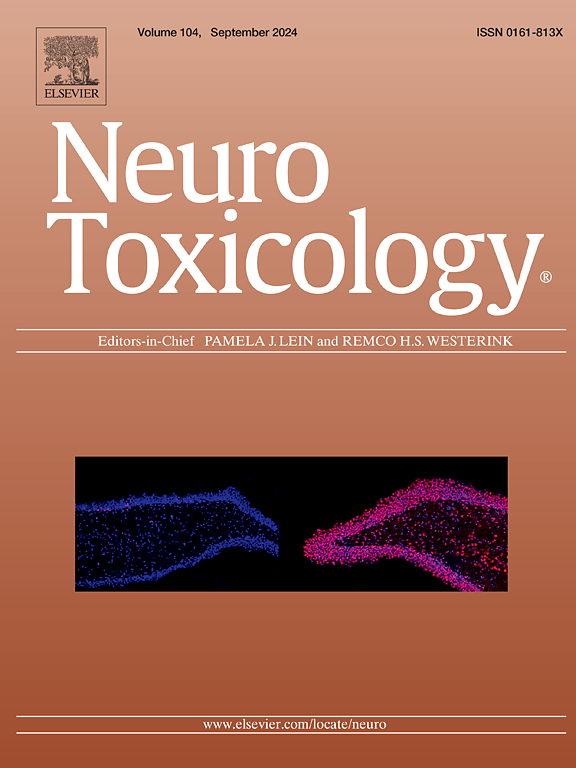Early life perfluorooctanoic acid exposure induces long-lasting effects on social behaviors in adult mice
IF 3.9
3区 医学
Q2 NEUROSCIENCES
引用次数: 0
Abstract
Perfluorooctanoic acid (PFOA), a persistent organic pollutant widely used in the field of medicine, industry and agriculture, has been linked to various adverse health risks. However, the potential effects of early-life exposure to PFOA on social behaviors in adulthood remain unclear. ICR mice were exposed to different doses of PFOA (0, 1, 3 mg/kg) in drinking water for three weeks during the postweaning period. The open field test (OFT), social dominance test (SDT), novel object recognition (NOR) test, social interaction test (SIT) and social novelty preference (SNP) test were conducted to evaluate social behaviors. Behavioral results showed that postweaning PFOA exposure significantly decreased social dominance of both male and female mice during adulthood. PFOA exposure also reduced social interaction and improved social novelty in male mice, while impaired memory only in female mice. Results of 16S rRNA sequencing analysis showed the alpha-diversity, β-diversity and composition of gut microbiota altered after PFOA exposure. Following PFOA exposure, the abundance of beneficial bacteria such as Lactobacillus decreased specifically in female mice, whereas harmful bacteria such as Desulfovibrio increased in both male and female mice. Several pathways altered were predicted according to Kyoto Encyclopedia of Genes and Genomes (KEGG). The study reveals that postweaning exposure to PFOA has enduring effects on several social behaviors with variations dependent on sex, which may be linked to alterations in gut microbiota composition.
早期全氟辛酸暴露会对成年小鼠的社会行为产生长期影响。
全氟辛酸(PFOA)是一种广泛应用于医药、工业和农业领域的持久性有机污染物,与各种不利的健康风险有关。然而,早期接触PFOA对成年后社会行为的潜在影响尚不清楚。ICR小鼠在断奶后连续3周暴露于不同剂量的PFOA(0、1、3mg/kg)饮用水中。采用开放场测验(OFT)、社会优势测验(SDT)、新物体识别测验(NOR)、社会互动测验(SIT)和社会新颖性偏好测验(SNP)对社会行为进行评价。行为学结果显示,断奶后暴露于PFOA显著降低了雄性和雌性小鼠在成年期的社会支配地位。暴露在PFOA中也会减少雄性小鼠的社交互动,提高社交新颖性,而只有雌性小鼠的记忆力受损。16S rRNA测序分析结果显示,PFOA暴露后肠道微生物群的α多样性、β多样性和组成发生了变化。在PFOA暴露后,雌性小鼠的有益细菌如乳酸杆菌的丰度明显减少,而有害细菌如Desulfovibrio在雄性和雌性小鼠中均增加。根据《京都基因与基因组百科全书》(KEGG)预测了几个通路的改变。该研究表明,断奶后接触PFOA对几种社会行为有持久的影响,这种影响取决于性别,这可能与肠道微生物群组成的改变有关。
本文章由计算机程序翻译,如有差异,请以英文原文为准。
求助全文
约1分钟内获得全文
求助全文
来源期刊

Neurotoxicology
医学-毒理学
CiteScore
6.80
自引率
5.90%
发文量
161
审稿时长
70 days
期刊介绍:
NeuroToxicology specializes in publishing the best peer-reviewed original research papers dealing with the effects of toxic substances on the nervous system of humans and experimental animals of all ages. The Journal emphasizes papers dealing with the neurotoxic effects of environmentally significant chemical hazards, manufactured drugs and naturally occurring compounds.
 求助内容:
求助内容: 应助结果提醒方式:
应助结果提醒方式:


